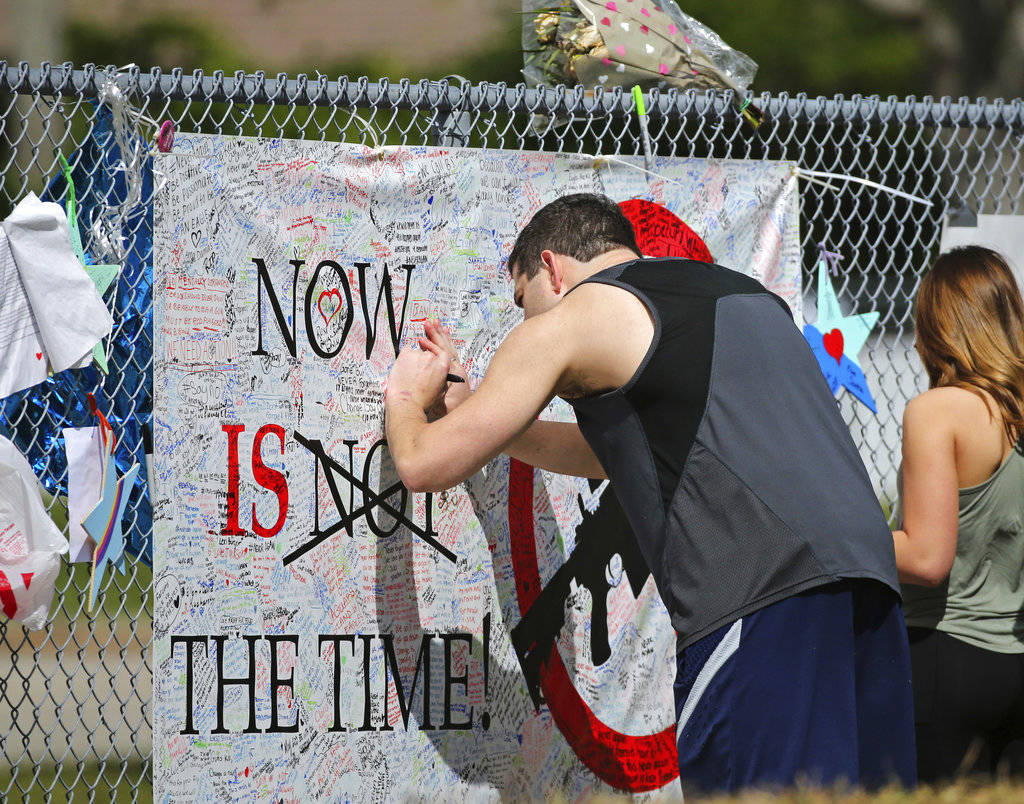In a visit to Juneau last week, U.S. Rep. Don Young suggested that Americans should turn to their state lawmakers for a response to the Feb. 14 mass shooting at a school in Parkland, Florida.
So far, the only legislative response has come from Rep. David Eastman, R-Wasilla, who has introduced a bill that would allow teachers and other school district employees to carry firearms on school grounds. Another bill, introduced by Rep. Geran Tarr, D-Anchorage, touching on the subject of gun control may have momentum and will be heard in committee today.
In the Alaska Legislature, responses to the shooting may have been muffled by a procedural deadline. Feb. 19 was the last date for lawmakers to introduce bills. After that date, bills must be introduced on behalf of a committee or the governor.
Because of that deadline, lawmakers had just five days to react to the shooting, craft a response, translate it into the legal language used by the Legislature, proofread it for legality and other potential problems, then submit it.
On Feb. 20, talking briefly with the Empire, Rep. Adam Wool, D-Fairbanks, and Rep. David Guttenberg, D-Fairbanks, said they felt the deadline prevented them from considering legislation. Guttenberg said Tuesday he didn’t have a proposal immediately at hand, but the deadline meant he couldn’t develop one.
Other states, without that deadline, have advanced various proposals. In Florida, two proposals banning various types of semi-automatic rifles have been turned down by legislative committees. A separate idea to arm teachers in the state is continuing to advance.
Iowa’s legislature has advanced a bill requiring schools to draft policies for what to do in case of a mass shooting. Kentucky’s legislature is considering whether to arm teachers. Illinois lawmakers are calling for state licensing for gun stores and considering a ban on AR-15s. Idaho is considering going the other direction by allowing anyone over age 21 to carry a concealed firearm.
In Ohio, 22 bills have been filed to change that state’s gun laws. In Michigan, almost 50 have been filed since January 2017.
In Alaska, 10 bills dealing with firearms have been filed since January 2017, and most touch on the subject only tangentially. Three are bills reforming the state’s criminal justice system (and thus affecting prison sentences for crimes involving firearms). Another alters regulations with the state militia. Still another adds a reporting process if someone finds a firearm while buying a foreclosed storage unit.
That leaves a handful that deal with firearms directly. A bill by Rep. George Rauscher, R-Sutton, would legally shield someone who brandishes a firearm on their own property to deter a criminal.
A bill by Rep. Mark Neuman, R-Big Lake, would allow high school students older than 18 to keep unloaded firearms in their vehicles, even on school grounds. Currently, people older than 21 are allowed to do so.
Eastman’s bill, introduced Feb. 21, would amend existing law that allows school employees to carry firearms with district permission. Neither Eastman nor the House’s Republican minority were able to provide comment on the idea before the end of the day Tuesday. Former Rep. Bob Lynn, R-Anchorage, suggested a more regulated version of the same idea in 2013, but the idea never advanced.
Because Rauscher, Eastman and Neuman are in the House’s Republican minority, their legislation likely lacks the support to advance. No member of the Senate’s predominantly Republican majority has proposed any firearms-related legislation, and none is likely, caucus staff said.
The sole significant firearm-related bill from a member of a majority caucus is House Bill 75 by Rep. Geran Tarr. Filed last year, it began picking up momentum after the Florida shooting and has its first committee hearing at 1 p.m. today in the House Judiciary Committee.
“Of course, there is a public demand (for action) now, like nothing I’ve ever seen,” Tarr said.
HB 75 doesn’t address school shootings or firearms in general. Instead, it’s narrowly focused on the issue of firearms in domestic violence cases. If passed by the House and Senate, then signed into law by Gov. Bill Walker, HB 75 would allow police to temporarily seize the firearms of someone deemed by a court to be a danger to themselves or others. The seizure could last from three days to six months and is intended to be used in domestic violence situations or in cases where someone is mentally ill or at risk of suicide.
“It’s a (violence) prevention tool,” Tarr said.
She explained that Alaska’s police can’t be everywhere, and while her bill doesn’t address mass shootings, she believes it’s a way to reduce Alaska’s highest-in-the-nation rate of gun deaths. According to the Centers for Disease Control and Prevention, there were 177-firearm related deaths in Alaska in 2016, or about 23.3 per 100,000 residents, the highest rate in the country. Most of the deaths were suicides.
“I would hope this is a place we could start, because innocent lives are being lost,” she said.
While her bill didn’t come in response to the Parkland shooting, she feels it is moving now because of that incident.
“Perhaps this Florida shooting was the tipping point. These students have galvanized young people,” Tarr said. “I think they’re going to demand change, and I think they’re going to have an impact.”
Rep. Paul Seaton, R-Homer and a co-chairman of the House Finance Committee, suggested Tuesday morning that lawmakers could respond to the shooting through the state budget process rather than new legislation. He pointed to the funding of a new coordinator position in the state’s comprehensive mental health budget. It is not clear whether that position will be approved by the Legislature.
• Contact reporter James Brooks at jbrooks@juneauempire.com or call 523-2258.

